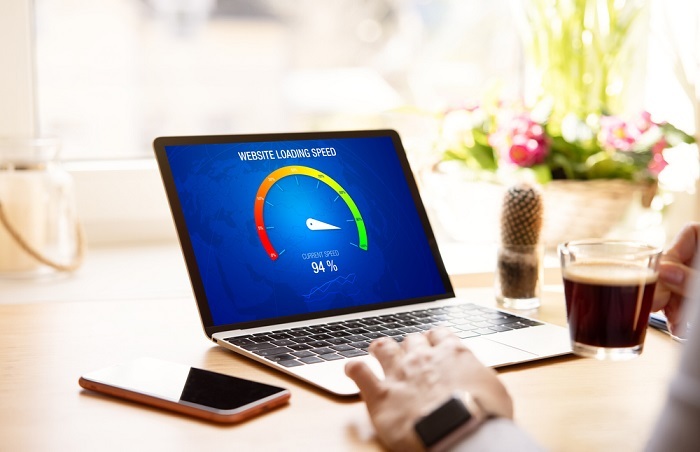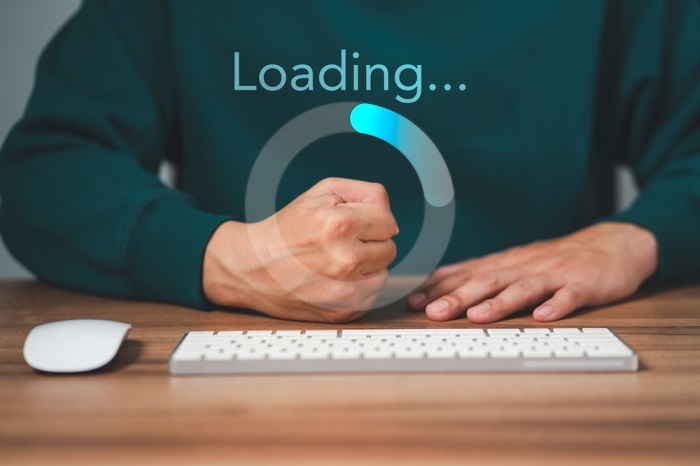
 Data Structure
Data Structure Networking
Networking RDBMS
RDBMS Operating System
Operating System Java
Java MS Excel
MS Excel iOS
iOS HTML
HTML CSS
CSS Android
Android Python
Python C Programming
C Programming C++
C++ C#
C# MongoDB
MongoDB MySQL
MySQL Javascript
Javascript PHP
PHP
- Selected Reading
- UPSC IAS Exams Notes
- Developer's Best Practices
- Questions and Answers
- Effective Resume Writing
- HR Interview Questions
- Computer Glossary
- Who is Who
Why Website Speed is Crucial for Digital Marketing Success?
These days, paid marketing, content, social media, and design are the main topics covered in most guides to success in digital marketing for e-commerce enterprises. Website performance, or more particularly, website speed, is yet another critical element that is frequently disregarded or taken for granted.

The success of online shopping depends on the speed of the website. It immediately affects your conversion rates, repeat business, and search engine rankings. A quick load time for your website is even more crucial as a competitive advantage in light of recent changes to Google Search ranking.
Why is website speed important?

A quicker website will indirectly enhance ranks on every search engine that considers user experience, not just Google's Core Web Vitals. Search engines will recognize that users prefer your site over others if they notice that fewer users are returning to the search results after clicking on your development due to speed and will rank your site accordingly. Here are a few things which are affected by the internet speed.
SEO rankings
Search engine optimization (SEO) is a critical component of digital marketing that helps increase website visibility and draw in organic traffic. Page loading speed is one of the elements that search engines like Google take into account when ranking web pages. As a result, the SEO rankings might be greatly impacted by a website that loads slowly due to a slow connection.
Search engine crawlers might not be able to index all of the pages on a website that takes too long to load, or they could only be able to index some of the material. Less exposure and worse rankings for particular keywords may follow, which would affect the website's organic traffic.
Furthermore, a slow-loading website might raise bounce rates or the proportion of visitors who depart after seeing just one page. Low rankings result from high bounce rates, which tell search engines that the website might not be offering a good user experience.
Loading speed affects user experience
One of the most important elements to take into account when it comes to user experience is the speed at which a website loads. A fast-loading website is not only vital for retaining user attention but also for avoiding bounce rates. Yet, slow internet speeds can have a significant negative influence on the user experience.
Due to their impatience and frustration, consumers are likely to give up on a website if it takes too long for it to load due to a sluggish internet connection. Studies show that even a brief delay can result in people losing interest and visiting other websites, leading to a high bounce rate.
Also, visitors may have a poor impression of the brand if a website loads slowly. Visitors may believe that the website is out-of-date or poorly managed, which would be harmful to the brand's credibility. This may lead to the loss of potential clients and lower the likelihood of repeat business.
Marketing through social media
Businesses now use a variety of social media channels to connect with their target market thanks to the importance of social media marketing to digital marketing. Low internet speed is a big barrier in social media marketing since social media platforms like Facebook and Twitter give preference to websites that load quickly.
Users on social media platforms are likely to click away from a link and move on to another post or website when a website loads slowly because of slow internet. The likelihood that users would interact with the information or share it with their followers is decreased as a result, which in turn reduces the visibility of the content and the effectiveness of the social media marketing campaign.
Social networking websites like Facebook and Twitter reward websites with a quick load time with better visibility, increasing their exposure to potential clients. As a result of their lower visibility, slow-loading websites have a lower likelihood of generating engagement and sales.
Mobile optimization
With more people than ever using their mobile devices to access the internet, mobile optimization is a crucial component of digital marketing. Designing websites that are user-friendly, responsive, and load rapidly on mobile devices is referred to as mobile optimization. Poor internet speed can hurt mobile optimization and harm digital marketing.
Due to the slow internet, people are more likely to give up on a website that takes too long to load on mobile devices and look for alternatives. The effectiveness of digital marketing initiatives may be harmed as a result of diminished engagement, lower conversion rates, and decreased visibility.
Mobile websites that take too long to load may give users a bad impression of the brand, which could result in lost business and a decline in credibility. This may hurt recurring business and lower the total ROI of digital marketing initiatives.
User engagement
Digital marketers must focus on user engagement as they work to produce content that connects with and motivates their target audience to act. User engagement might be negatively impacted by slow internet speed, which will hurt digital marketing activities.
Because people are more likely to leave a website that is taking too long to load owing to slow internet, engagement is diminished. Users may become frustrated by websites that take a long time to load, which may decrease their trust in the company and its brand. Thus, the overall ROI of digital marketing activities may suffer and repeat business may decline.
Websites that take a long time to load may also see fewer visitors and shorter session times. Visitors may only access one page on a website before leaving without reading any other material or taking any other action. As a result, digital marketing campaigns may be less effective since firms rely on user interaction to boost ROI and generate conversions.
Brand reputation
To build a favorable perception of their brand among their target audience, firms strive to build their brand reputation, which is a crucial component of digital marketing. Brand reputation might be negatively impacted by slow internet, which will harm digital marketing activities.
Users may feel irritated and form a poor opinion of the brand when a website takes too long to load because of slow internet. Websites that take a long time to load may come seen as unprofessional, which may impair their credibility and trustworthiness. This may harm recurring business and lower the total ROI of digital marketing initiatives. Negative reviews, ratings, and comments may also come from slow-loading websites, which will ultimately harm a brand's reputation.
Bad reviews may deter potential customers from interacting with the company, resulting in diminished visibility, engagement, and eventually, ROI. Slow-loading websites can also affect brand recognition because customers are more likely to complain about them to their social media friends and followers. This may lead to the brand having less visibility and a smaller audience, which will eventually affect how effective digital marketing activities are.
The bottom line
For digital marketing campaigns to be successful, website speed is essential. Low internet speed can cause websites to load slowly, which can harm user experience, user engagement, SEO rankings, social media marketing, mobile optimization, and brand reputation. Businesses must give priority to website performance optimization, which includes reducing file sizes, optimizing graphics, lowering HTTP requests, and utilizing a content delivery network, to assure the success of digital marketing initiatives (CDN). Businesses may increase user engagement, SEO rankings, traffic, and eventually return on investment (ROI) from digital marketing initiatives by speeding up their websites.

